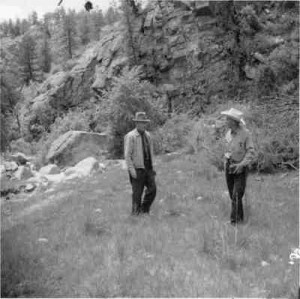Column by John Mattingly
Economy – January 2009 – Colorado Central Magazine
Back in the mid-1980s I was in New York City working with various financiers on omnibus loan re-structuring bailouts for farmers, who, at that time, were going through the same general credit crisis now playing out broadly (and with much more attention) in today’s world economy. I was a principal in a small firm, Judson Securities, which sought funding for a program we called EIO, Equity Investment Opportunity, a fund that, with modest success, matched ag-friendly investors with good farmers.
The concept was that some farmers were in financial trouble due to back-breaking interest rates (remember when the prime rate was 13%), and not because they were breaking their backs as bad managers. I was point man for making field reports on the subject farms to see which farms were failing from pure fiscal functions and which were going down from bad management, the former being considered for an equity loan from potential EIO investors. But on one occasion, I was sent to New York to provide first-hand data to a firm that was a precursor of an investment bank (investment banks did not exist at that time due to regulatory restrictions).
Over brunch with a man I’ll call Larry, who headed up a Park Avenue firm that then specialized in international arbitrages and IPOs (initial public offerings), I felt both out of place and in over my head. Thoughtfully chewing his asparagus/Brie omelet, Larry talked mostly about conflicts among members of his new co-op building, the difficulty of finding a good mechanic for a Lamborghini, the dock rats around his yacht, the death of his tailor which had resulted in all his suits not fitting right, and the reckless gardener at his summer home. Given this tangle of external concerns, it was a wonder the man had time to go to work in the morning.
Larry eventually confided that, while he felt bad for farmers — he’d actually met a farmer once at a fruit stand in Jersey — he was having a hard time getting by on his salary of $8,400 a week. And this was the mid-80s, when the buying power of the U.S. dollar outdistanced our current greenback by more than a brunch. Premium gas and a gallon of milk were about $1.25 a gallon, a couple bucks would get you a cab ride almost anywhere in NYC, I bought a pair of Redwing boots for $5, Levis for $10, a good cuppa coffee for a quarter, and our bill for brunch at the Helmsley Hotel was only $25, including champagne and tip (I was buying, as Larry had also indicated he was tight until he landed his year-end bonus, which he expected to be over $5 million).
Larry’s claims of being short didn’t provoke a wellspring of sympathy from me, as I was trying to assemble a bailout package with Larry’s company for a group of farmers who, I knew from having seen their tax returns, were living on less than $8,400 a year.
Brunch with Larry set me to wondering three things.
1. Why is it that when money lifts a person out of poverty to a level of reasonable comfort, it really can buy happiness, but the addition of more money does not necessarily result in more happiness, or additional comfort?
2. How is it that CEOs justify (or get away with) such disproportionate (some might say obscene) wages and bonuses even when their job performance sucks?
3. What is the difference between what money is and what it means?
After years of pondering, I’ve come up with these tentative thoughts.
1. Money and happiness. Having more money than you need can lead to expensive appetites, as with Larry, and the result is that the money is being spent on all these things that were formerly out of reach, and at the end of the day, one feels just as cash-strapped as ever. Notable exception: Warren Buffet, the richest man in the world (net worth of $63 billion) still lives modestly.
Also, expensive appetites can lead to complicated malfunctions and interactions. When the battery goes dead on your old Chevy, you go to the auto parts store and put in a replacement for about $50. When the battery goes out on a Lamborghini, it must go to the dealer, costs $4,000, and requires resetting an entire menu of electronic systems. And yacht maintenance ain’t like taking care of a little ol’ fishin rig.
Hanging around with people who have too much money can mean having useless conversations about expensive batteries and other travails of the rich and frustrated rather than talking about more stimulating subjects, which can trigger a downward spiraling syndrome that ends in a species of cluttered depression.
While money is sometimes equated with freedom, excess money can be a drain on that freedom if it requires a lot of irritating, time-draining management.
You often hear people say, “Well, I’d sure like to try having the problem of too much money!” I suggest to them: Before you do, try having brunch with Larry.
2. CEO compensation. Apart from the undeniable element of corporate stupidity, I have only a slim theory here. In any organization, power can be secured by an individual in the organization by isolating certain skills or key pieces of information. A simple example: if one person knows the complicated procedure for starting up the necessary machinery of a business, and that person doesn’t share the knowledge, that person becomes irreplaceable to the organization.
Both intentionally and, I think, subconsciously, people in an organization have an instinct to be stingy with their specific areas of knowledge about how the organization functions because, in a sense, sharing your knowledge makes you replaceable. Giving up any secrets you’ve learned over the years reduces your position to something that can be put into a flow chart of authorities and responsibilities. In other words, if what you do is fully understood, then anybody can do it.
Most of corporate America functions this way. The corporation itself is a structure designed to survive the life of any given group of individuals by this very process of reducing human functions within the organization to a schematic of replaceability. Thus, as individuals die, quit, are fired or laid off, the organization goes on without them.
Though they might not describe their job this way, most of what middle managers do in a corporation is make sure information about the function of the organization is generalized so that no segment of, or individual in, the organization becomes irreplaceable. This is for both the longevity and security of the organization.
But at the upper levels of management in any organization — be it a multi-national corporation or a small business — it becomes easier to sequester key information and create an illusion of being irreplaceable. In corporations, the corporate board is the only check and balance on the CEO, and in most cases the board is more concerned about not making a mistake than doing the right thing. And the board certainly doesn’t want to have to get involved in actually running the organization. The board’s role is limited to setting policy and delegating at only the highest level.
I’ve had CEOs confide that it took them a while and they had to work hard for a long time to get there, but they finally reached that sweet spot at the top of the organization where they did almost nothing, but were perceived to be crucial to almost everything, and thus were paid handsomely for it.
The structural problem is basically that the CEOs in many corporations are at a level and in a position where they don’t have a supervisor who really knows enough to evaluate their performance, let alone whether that CEO is actually doing anything.
3. What is money?
By definition, it’s coins or paper that serve as a medium of exchange when backed by a responsible, accountable government. The exchange schematic is hard-wired with responsibility and trust, such that the government must manage the supply of money with connection to some solid reality. It used to be gold, but now it’s related to metrics of productivity, gross national product, velocity of exchange, and growth.
However, for most of us, money is more than a mere medium of exchange, and the new metrics of meaning are either too confusing to understand, or collapse entirely on close examination.
New Age folks describe money as a person’s soul-energy, and how we expend that energy makes a big difference to both the cosmos and our personal integrations.
Other people claim money is dirty, something they hate: the root of all evil, the objectification of greed, something they would rather not deal with.
Others describe money as freedom.
Still others seem to enjoy counting it.
On Wall Street, money can be a way of keeping score among CEOs. In the (now deceasing) corporate culture, companies granted CEOs extravagant bonuses as a way of showing up other companies.
On the farm, I define money quite simply as stored work. I think the definition actually covers most of the bases, but some people have argued that, “Hey, I know people who work like dogs and end up with nothing, and others who never work a day in their life and live like kings.”
True. It should be obvious from all of the above that, in the wide world of work and money, there is seldom justice.
John Mattingly is currently abiding in Creede, a good place to avoid the practice of agriculture.


